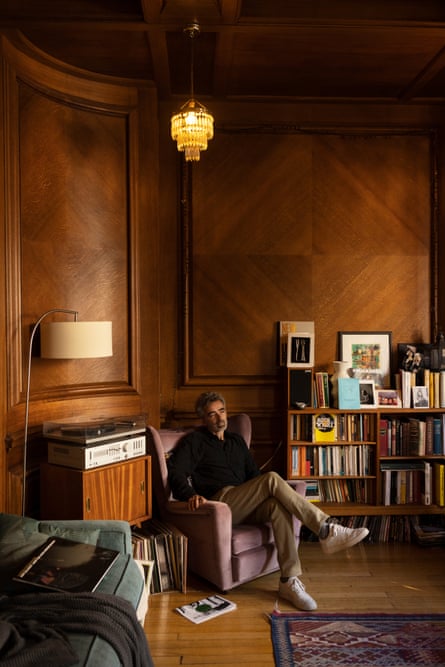David Farr is perplexed by two small questions: might it be possible to live for ever, and what would it mean if we could? “I’ve heard rumours of Putin having cryogenic chambers, and Elon Musk has some kind of foundation looking at what happens beyond death. They’re all obsessed by the one thing they can’t defeat,” says the 52-year-old writer and director, who has neatly embodied this question in a woman called Kath, who has reincarnated herself as a cyborg.
She has done so by spending years downloading her thoughts, memories and feelings, in a process that doesn’t seem so far removed from an intensive course of psychoanalysis. Like all good speculative fiction, Farr’s new play A Dead Body in Taos – which began a four-city tour in Bristol last month – is not just about an imagined future but about the quirks and paradoxes of society today.
The play hops between Kath’s 1960s teenage years of consumerist TV adverts aimed at stay-at-home housewives, and the New Mexico town where – to the horror of her estranged daughter – she is found both dead and undead many decades later. She had followed in the footsteps of the cult abstract expressionist artist Agnes Martin who, in search of silence and inwardness, ended up in Taos, home to the famed art colony. Farr is best known today for his screenwriting, including an award-winning TV adaptation of John le Carré’s The Night Manager and the miniseries Troy: Fall of a City. But theatre was his first love, and A Dead Body in Taos is the culmination of something he has been mulling over ever since seeing the groundbreaking Adam Curtis documentary series, Century of the Self, in 2002.
After life … Clara Onyemere and Eve Ponsonby in A Dead Body in Taos. Photograph: Helen Murray
“It argued something really scary,” he says, “That the social rebellion and experimentation of the 1960s, which were meant to be fighting against the patriarchal, corporate and governmental control of the 1950s, particularly in America, but also here in the UK, suddenly shifted from a collective movement into this very strangely individual thing of self-enlightenment and sexual freedom. And ironically, that generation created the most selfish, individualistic age that there has ever been, which is the age that I was brought up in.”
He ponders these questions at a desk that he shares with a framed letter from Harold Pinter, congratulating him for his 50th-anniversary revival of The Birthday Party in 2008, and a fuzzy childhood photograph of his Jewish forebears. He’s endearingly proud of both. Two guitars stand by a wall in the wood-panelled flat, high above the rumbling traffic of one of north London’s busier quarters, where he lives with his partner.
Unfortunately, he says, he has hurt his hand – badly enough to stop him strumming the guitars, although it does not impede his longtime routine of spending every morning writing. He has several film scripts in the works, and has just completed the second in a series of children’s books inspired by stories told to him by the great-aunt and great-uncle in the photograph, who escaped with his grandmother from Germany in 1938.
Children’s fiction is a new departure, upon which he embarked during the pandemic, though his debut novel, The Book of Stolen Dreams, is nothing like many of the hobbyist works tossed out by underemployed celebrities. It’s a quaintly written but genuinely transporting fable of a brother and sister trying to rescue their father in a world destroyed by a terrifying dictatorship. He bats away compliments with the quip: “Well, for a start, I’m not a celebrity.”
 “I love telling stories, sometimes through directing.” David Farr. Photograph: Manuel Vazquez/The Guardian
“I love telling stories, sometimes through directing.” David Farr. Photograph: Manuel Vazquez/The Guardian
While this is true, it’s also a misrepresentation of a left-field but very productive 30-year career. Farr grew up in the commuter-belt town of Guildford, the son of a surveyor father and a mother who worked as a school support teacher. “It was just the most weirdly materialistic, individualistic world in terms of anything else that might be of any interest to anybody. The biggest problem was boredom,” he says. Fortunately, at grammar school in his late teens, he had “the classic English teacher who just changed everything”, introducing him and a small group of like-minded friends to the plays of Beckett, the novels of Kafka and the films of Fellini and Godard, often out of school hours. So while Cambridge, where he went to university, “was quite a shock in terms of meeting lots of Londoners, and how confident they were, I didn’t have a problem in terms of ideas. I knew my Ionesco, and suddenly Kafka was A Thing.”
One of his college contemporaries was the actor Rachel Weisz – “a highly confident, very clever, albeit quite complicated north London girl, from a very intellectual Jewish family”. Together they started making “these extraordinarily weird plays, which we’re still very proud of, actually”. They set up a theatre company, Talking Tongues, and won a Guardian student drama award at the Edinburgh fringe. Farr emerged from university with a double first and was given his first professional directing job by Stephen Daldry at the Gate theatre in London. At 32, he became artistic director at Bristol Old Vic, followed by four years running the Lyric Hammersmith and a stint as an associate director at the RSC.
Then he parachuted off a career cliff. “I decided about 10 years ago that I wouldn’t have a plan of any kind because I suddenly realised that I just don’t really fit in,” he says. “I don’t have just one thing that I want to do. If someone asked me to sum myself up in a single word, I’d say I’m a storyteller, because they don’t do anything. I’m not a painter or a photographer, but I love telling stories, sometimes through directing.”
He still loves theatre, he says, “but I have very particular taste, and that’s OK. I don’t enjoy the middlebrow. I have no problem with the populist, but there’s stuff in the middle that I find polite, with a lot of false consciousness going on. People are just pleased to get a ticket to watch a famous actor; there’s a complete lack of serious engagement.”
Sign up to Inside Saturday
The only way to get a look behind the scenes of our brand new magazine, Saturday. Sign up to get the inside story from our top writers as well as all the must-read articles and columns, delivered to your inbox every weekend.
Privacy Notice: Newsletters may contain info about charities, online ads, and content funded by outside parties. For more information see our Privacy Policy. We use Google reCaptcha to protect our website and the Google Privacy Policy and Terms of Service apply.
This feeds into a bigger objection. “What I feel about British culture is that we’re basically very comfortable in upper-class nostalgia slash romanticism, and we have an interesting sentimental attachment to the working-class underdog, but we’re uncomfortable in that middle space where the French, for example, have no problem. There’s also something about our empiricism which means that we don’t see the idea of our world – we just see ourselves living our life.”
When he was young he read thrillers rather than science fiction, and it is this that links the retro-fantasy world of his new novels with the espionage one of John le Carré, a writer he takes very seriously indeed. “One minute you’re a dentist who plays the violin, living in a city that [your family has] lived in for 150 years, and the next minute everything changes. Nothing is solid, and in our world today I think that’s more and more true. The espionage thriller shows that everything is fragile. It goes back to politeness: how polite community truths are shown to be untrue.”
A Dead Body in Taos is more akin to John Wyndham’s mid 20th-century speculative novel The Midwich Cuckoos, about alien babies, which Farr also recently adapted for television. “Wyndham speculates on a very specific thing and asks: ‘What if this happens, what would that do, and where would it take you?’ If John Wyndham were alive today, he would be all over artificial intelligence.”
The questions Farr’s own play addresses are simultaneously cutting-edge – “What if Kath is actually a pioneer? What if she is heading somewhere genuinely revolutionary?” – and hundreds of years old, harking back to the 17th-century philosophy of John Locke, who first recognised the centrality of consciousness and memory to human life. “What I love about AI,” Farr says, “is that it really taps into age-old philosophical questions around who we are.”
A Dead Body in Taos is at Theatre Royal Plymouth to 22 October; Wilton’s Music Hall, London, 26 October to 12 November; and Warwick Arts Centre, Coventry, 15 to 19 November.
https://news.google.com/__i/rss/rd/articles/CBMiX2h0dHBzOi8vd3d3LnRoZWd1YXJkaWFuLmNvbS9zdGFnZS8yMDIyL29jdC8yMS9kYXZpZC1mYXJyLXBsYXl3cmlnaHQtaW50ZXJ2aWV3LWRlYWQtYm9keS1pbi10YW9z0gEA?oc=5



